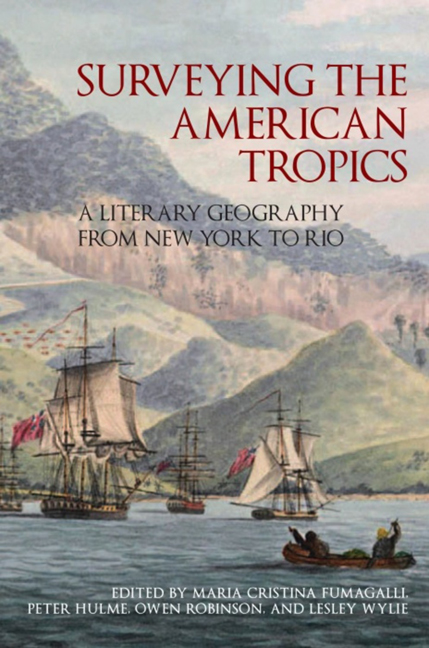Book contents
- Frontmatter
- Dedication
- Contents
- List of illustration
- Introduction
- A Tree Grows in Bajan Brooklyn: Writing Caribbean New York
- Reading the Novum World: The Literary Geography of Science Fiction in Junot Díaz's The Brief Wondrous Life of Oscar Wao
- Inventing Tropicality: Writing Fever, Writing Trauma in Leslie Marmon Silko's Almanac of the Dead and Gardens in the Dunes
- Imperial Archaeology: The American Isthmus as Contested Scientific Contact Zone
- Space Age Tropics
- Black Jacobins and New World Mediterraneans
- The Oloffson
- Dark Thresholds in Trinidad: Regarding the Colonial House
- Micronations of the Caribbean
- Golden Kings, Cocaine Lords, and the Madness of El Dorado: Guayana as Native and Colonial Imaginary
- Suriname Literary Geography: The Changing Same
- The Art of Observation: Race and Landscape in A Journey in Brazil
- Notes on Contributors and Editors
- Index
Micronations of the Caribbean
- Frontmatter
- Dedication
- Contents
- List of illustration
- Introduction
- A Tree Grows in Bajan Brooklyn: Writing Caribbean New York
- Reading the Novum World: The Literary Geography of Science Fiction in Junot Díaz's The Brief Wondrous Life of Oscar Wao
- Inventing Tropicality: Writing Fever, Writing Trauma in Leslie Marmon Silko's Almanac of the Dead and Gardens in the Dunes
- Imperial Archaeology: The American Isthmus as Contested Scientific Contact Zone
- Space Age Tropics
- Black Jacobins and New World Mediterraneans
- The Oloffson
- Dark Thresholds in Trinidad: Regarding the Colonial House
- Micronations of the Caribbean
- Golden Kings, Cocaine Lords, and the Madness of El Dorado: Guayana as Native and Colonial Imaginary
- Suriname Literary Geography: The Changing Same
- The Art of Observation: Race and Landscape in A Journey in Brazil
- Notes on Contributors and Editors
- Index
Summary
Nowhere islands everywhere
Amicronation might be located in an apartment, a garden, or a caravan, on a pile of sand or a submerged reef. Some are born of social discontent and idealism; others are created by pranksters, for a laugh; still others from the desire to avoid paying tax; some are fraudulent money-making schemes; and some charge a fee for citizenship, or even a noble title. All are performative fictions—inventions—unrecognised by other ‘legitimate’ nations. Micronations generally are speculative. The online Invent-a-Micronation Contest organised by BuildingBlog, is dedicated to architectural as well as urban speculation, and to landscape futures. Its 2009 winner was a member of the Barricades Commission, ‘an urban micronation made of reclaimed and barricaded space’ inspired by the Paris Commune of 1871. Constructed from ‘permanently borrowed’ materials, it was intended to ‘take shape from the wreckage of a world it helps dismantle’. Micronations in this sense might be considered post-colonies—in Achille Mbembe's sense: the ‘thing that is, but only insofar as it is nothing’—erupting out of that ‘closure of the map’ which was the historical result of geographical imperialism, or what Hakim Bey calls ‘territorial gangsterism’.
Theorising a related concept—the ‘Temporary Autonomous Zone’ (TAZ)— Bey deliberately refrained from defining his subject, playfully (‘almost’ ominously) proposing that it was ‘almost’ self-explanatory, and that if the term were ever really to become current it would be ‘understood in action’— for the TAZ also is a speculative space, ‘almost a poetic fancy’. The TAZ is the equivalent in spatial terms of the forbidden moment, the insurrection which, unlike the revolution, never finds completion or therefore recognition. Bey sees the uprising as ‘festive’, rather than as engaging directly with the state and leading to violence and martyrdom. Or to put this into Bakhtinian terms, the TAZ is a carnival space. It is ‘a microcosm of that “anarchist dream” of a free culture’. It is an event in cartography, an eruption in the closed map.
- Type
- Chapter
- Information
- Surveying the American TropicsA Literary Geography from New York to Rio, pp. 231 - 262Publisher: Liverpool University PressPrint publication year: 2013



